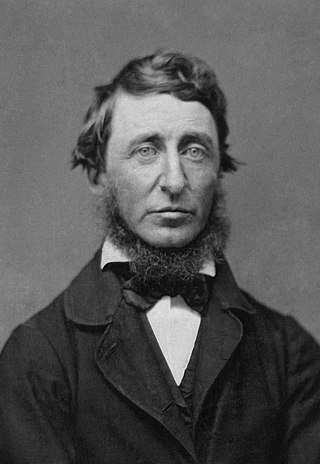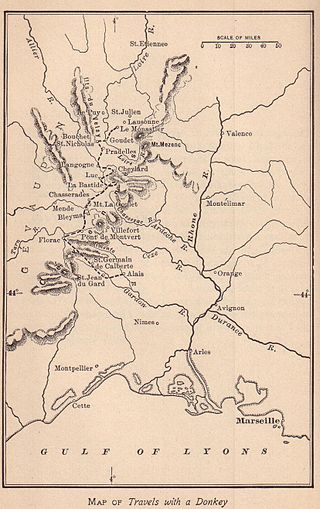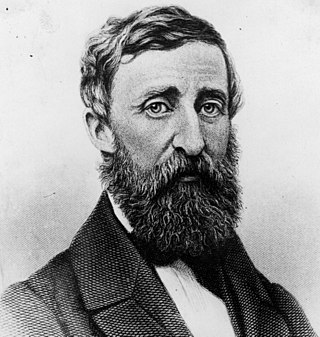
Henry David Thoreau was an American naturalist, essayist, poet, and philosopher. A leading transcendentalist, he is best known for his book Walden, a reflection upon simple living in natural surroundings, and his essay "Civil Disobedience", an argument in favor of citizen disobedience against an unjust state.
William Howarth was an American writer and professor emeritus at Princeton University. He published fourteen books and also wrote for such national periodicals as National Geographic, Smithsonian, The Washington Post, The New York Times, and The American Scholar.

John Muir, also known as "John of the Mountains" and "Father of the National Parks", was a Scottish-born American naturalist, author, environmental philosopher, botanist, zoologist, glaciologist, and early advocate for the preservation of wilderness in the United States.

Walden is an 1854 book by American transcendentalist writer Henry David Thoreau. The text is a reflection upon the author's simple living in natural surroundings. The work is part personal declaration of independence, social experiment, voyage of spiritual discovery, satire, and—to some degree—a manual for self-reliance.

Edward Paul Abbey was an American author and essayist noted for his advocacy of environmental issues, criticism of public land policies, and anarchist political views. His best-known works include the novel The Monkey Wrench Gang, which has been cited as an inspiration by radical environmental groups, and the non-fiction work Desert Solitaire.

Outdoor literature is a literature genre about or involving the outdoors. Outdoor literature encompasses several different subgenres including exploration literature, adventure literature, mountain literature and nature writing. Another subgenre is the guide book, an early example of which was Thomas West's guide to the Lake District published in 1778. The genres can include activities such as exploration, survival, sailing, hiking, mountaineering, whitewater boating, geocaching or kayaking, or writing about nature and the environment. Travel literature is similar to outdoor literature but differs in that it does not always deal with the out-of-doors, but there is a considerable overlap between these genres, in particular with regard to long journeys.
Environmental journalism is the collection, verification, production, distribution and exhibition of information regarding current events, trends, and issues associated with the non-human world. To be an environmental journalist, one must have an understanding of scientific language. The individual needs to put to use their knowledge of historical environmental events. One must have the ability to follow environmental policy decisions and environmental organizations. An environmental journalist should have a general understanding of current environmental concerns, and the ability to communicate information to the public in a way that is easily understood.
Ecocriticism is the study of literature and ecology from an interdisciplinary point of view, where literature scholars analyze texts that illustrate environmental concerns and examine the various ways literature treats the subject of nature. It was first originated by Joseph Meeker as an idea called "literary ecology" in his The Comedy of Survival: Studies in Literary Ecology (1972).
Lawrence Ingalls Buell is Powell M. Cabot Professor of American Literature Emeritus at Harvard University, specialist on antebellum American literature and a pioneer of Ecocriticism. He is the 2007 recipient of the Jay Hubbell Medal for Lifetime Achievement in American Literary studies, the "highest professional award that the American Literature Section of the MLA can give." He won the 2003 Warren-Brooks Award for outstanding literary criticism for his 2003 book on Ralph Waldo Emerson. His Writing for an Endangered World won the 2001 John G. Cawelti Award for the best book in the field of American Culture Studies. He retired from Harvard in 2011.

Lewis Hyde is a scholar, essayist, translator, cultural critic and writer whose scholarly work focuses on the nature of imagination, creativity, and property.
Terry Tempest Williams, is an American writer, educator, conservationist, and activist. Williams' writing is rooted in the American West and has been significantly influenced by the arid landscape of Utah. Her work focuses on social and environmental justice ranging from issues of ecology and the protection of public lands and wildness, to women's health, to exploring humanity's relationship to culture and nature. She writes in the genre of creative nonfiction and the lyrical essay.

Pilgrim at Tinker Creek is a 1974 nonfiction narrative book by American author Annie Dillard. Told from a first-person point of view, the book details Dillard's explorations near her home, and various contemplations on nature and life. The title refers to Tinker Creek, which is outside Roanoke in Virginia's Blue Ridge Mountains. Dillard began Pilgrim in the spring of 1973, using her personal journals as inspiration. Separated into four sections that signify each of the seasons, the narrative takes place over the period of one year.
David Rains Wallace is an American writer who has published more than twenty books on conservation and natural history, including The Monkey's Bridge and The Klamath Knot. He has written articles for the National Geographic Society, The Nature Conservancy, the Sierra Club, and other groups. Wallace's work also has appeared in Harper's Magazine, The New York Times, Sierra, Wilderness and other periodicals.

Gregory Clark is an American scholar and teacher working in rhetorical studies and American cultural criticism. He retired from academic work in 2021. His work is both theoretical and critical, developing concepts of how influence works that he then uses to study capacities for influence inherent in American cultural practices.

Walking, or sometimes referred to as "The Wild", is a lecture by Henry David Thoreau first delivered at the Concord Lyceum on April 23, 1851. It was written between 1851 and 1860, but parts were extracted from his earlier journals. Thoreau read the piece a total of ten times, more than any other of his lectures. "Walking" was first published as an essay in the Atlantic Monthly after his death in 1862.
David Gessner is an American essayist, memoirist, nature writer, editor, and cartoonist.

Brooks Ashton Nichols is the Walter E. Beach ’56 Distinguished Chair Emeritus in Sustainable Studies and Professor of English Language and Literature Emeritus at Dickinson College. His interests are in literature, contemporary ecocriticism, Romanticism, and nature writing. Nichols taught courses in Romanticism, 19th century literature, literature and the environment, and nature writing. He is especially well-known for his study of James Joyce's literary concept of "epiphany," his definition of Romantic natural histories, and his coinage of the phrase "Urbanatural roosting," an idea which links urban with natural modes of existence and argues for ways of living more lightly on the earth, for inhabiting our planet the way animals do, by altering our environments without harming those same environments.
Edward F. Mooney is an internationally recognized Kierkegaard scholar. A retired professor of religion and philosophy, he taught at Sonoma State University, Syracuse University, and in Israel at Haifa and Tel Aviv Universities. As president of the International Kierkegaard Society, he lectured at Vilnia, Frankfurt, Reykjavik, Jerusalem, Ber-Shiva, Tel Aviv, Dartmouth, Johns Hopkins, Auburn, and elsewhere. 2013–2015 he was visiting professor at Tel-Aviv and Hebrew University, Jerusalem, teaching seminars in American Studies on Thoreau. He received his B.A. in philosophy from Oberlin College (1962) and his M.A. and Ph.D. from The University of California, Santa Barbara (1968). His dissertation, written under Herbert Fingarette, linked philosophical themes in literature with the turn toward persons in the work of John Austin, Peter Strawson, and Iris Murdoch. He was professor of philosophy at Sonoma State University before moving to Syracuse. He has published books on Kierkegaard and several smaller studies on Stanley Cavell, Henry Bugbee, Bruce Wilshire, H. D. Thoreau, and others. He was president of the North American Kierkegaard Society for several years, in which capacity he lectured at Vilnia, Newcastle, Dartmouth, and elsewhere.
Michael P. Branch is an ecocritic, writer, and humorist with over three hundred publications, including work in The Best American Essays, The Best American Science and Nature Writing and The Best American Nonrequired Reading. An important member of the environmental and writing community, Western American Literature has described him as part of the "enduring procession of outdoor journalists."
Terry Gifford is a British scholar at Bath Spa University and poet. He is known for his role in developing British ecocriticism and his research interests include pastoral literary theory, ecofeminist analysis of D.H. Lawrence, John Muir, Ted Hughes, creative writing, poetry, and mountaineering. He has also published his own poetry collections.









